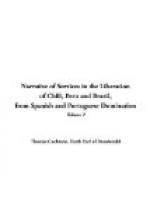Is it not ungenerous to exclude me from my share of the prize-money taken in the first expedition, though a prize tribunal is at this moment sitting in Rio de Janeiro to consider the claims of officers and men, nine-tenths of whom are dead? Is it not ungenerous to have engaged me in the extra-professional service of putting down revolution and anarchy in the Northern provinces, and when the mission was successfully accomplished, to have dismissed me from the Imperial service without one expression of acknowledgment or the slightest reward?
But to put generosity out of the question—is it wise so to do? That, says Burke—“can never be politically right which is morally wrong.” Brazil, doubtless, expects other nations to keep faith with her, and it is not wise on her part to afford a precedent for breaking national faith. The Amazon is a rich prize, and may one day be contested. What reply would Brazil give to a power which might attempt to seize it, under the argument that she broke faith with those who gave her the title to this, the most magnificent river on the face of the earth, and that therefore it was not necessary to preserve faith with her? It would puzzle Brazilian diplomatists to answer such a question.
From what has been adduced in this volume, it must be clear to all who have perused it with ordinary attention that Brazil is to this day in honour bound to fulfil the original stipulations solemnly entered into with me, and twice guaranteed under the Imperial sign manual, with all the official ratifications and formalities usual amongst civilized states. This I claim individually; and further—conjointly with the squadron—my share of the prize-money conceded to the captors by Imperial decree, without which customary incentive neither myself, nor any other foreign officer or seaman, would have been likely to enter the service. My individual claim, viz. the pay stipulated in the Imperial patents, was agreed upon without limitation as to time, as is clear from the expression that I should receive it whether “afloat or ashore,” “tanto em terra como no mar,” i.e. whether “actively engaged or not”—whether “in war or peace.” I have committed no act whereby this right could be cancelled, but was fraudulently driven from the Imperial service, as the shortest way of getting rid of me and my claims together. These are no assertions of mine, but are the only possible deductions from documents which have one meaning, and that incontestible.




